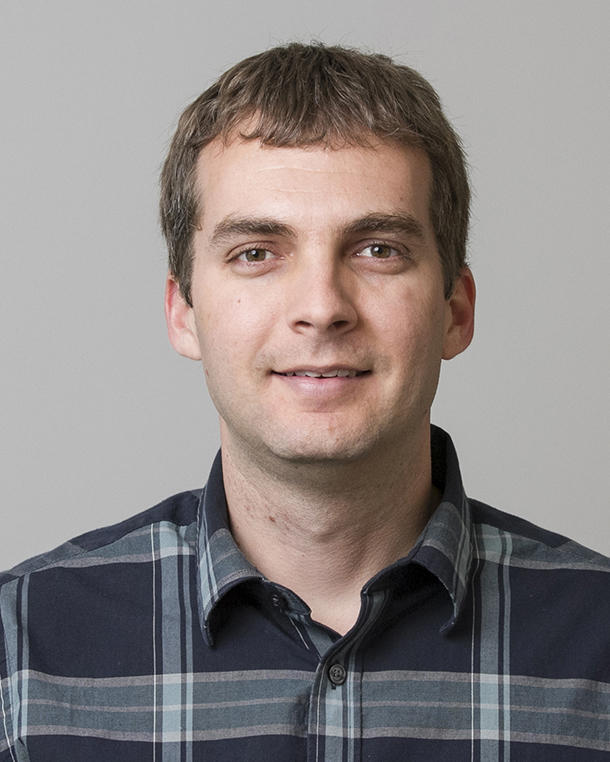Mitchell Machiela Awarded Scientific Tenure by the NIH
, by Elise Tookmanian, Ph.D.
In June 2024, Mitchell Machiela, Sc.D., M.P.H., was awarded scientific tenure by the NIH and promoted to senior investigator in the Integrative Tumor Epidemiology Branch. Dr. Machiela is an internationally recognized leader in the field of genetic epidemiology. His integrative research program aims to advance our understanding of how inherited (germline) and acquired (somatic) genetic variation jointly and individually affect cancer risk and progression.
One type of acquired variation that Dr. Machiela studies is genetic mosaicism, the presence of DNA alterations in only some of the body’s cells. Results from this work suggests that inherited germline variation (e.g., at TCL1A) or environmental exposures (e.g., smoking) may predispose to mosaicism. Genetic mosaicism can occur in the blood in a process called clonal hematopoiesis (CH). As blood cells are created in the body over the course of life (hematopoiesis), sometimes a single clone with a mutation will undergo a population expansion, forming a genetically distinct subpopulation of blood cells. Mosaic chromosomal alterations (mCAs) are a type of CH where instead of a single nucleotide mutation, large chromosomal structural or copy number changes occur. The prevalence of mCAs generally increases with older age and is associated with an elevated risk of blood cancers and select solid tumor subtypes.
Dr. Machiela conducted the fundamental, initial work to characterize the frequency and distribution of mCAs in normal tissues, particularly blood, using virtual karyotyping methods to detect mCAs from existing data. He was also the first person to investigate germline genetic variants associated with mosaic Y chromosome loss, identifying a susceptibility locus on the TCL1A gene. This finding led to a large, collaborative genome-wide association study (GWAS) that yielded 156 germline susceptibility regions, many with links to cell cycle regulation and cancer susceptibility. He has also expanded this work to children and adults from Sub-Saharan Africa. He continues to investigate the underlying mechanisms of the associations between CH and cancer.
Another facet of Dr. Machiela’s current work on genetic mosaicism focuses on how CH is associated with susceptibility to infections. Notably, he led a study which found that people with higher levels of mCAs in white blood cells had a greater risk of different types of infection, including severe COVID-19. These associations with infection were especially strong among cancer cases, suggesting mCAs are particularly relevant for infection risk in this immunosuppressed population. His work in this area was acknowledged by an NCI Director’s Award.
Dr. Machiela also conducts and analyzes genetic association studies to better understand the genetic architecture of different cancers, both pediatric and common adult. He has advanced our understanding of Ewing sarcoma, a pediatric bone and soft tissue tumor for which genetic risk factors remain poorly understood, through a major expansion of Ewing Sarcoma GWAS. Dr. Machiela recently co-led a new analysis of genetic susceptibility to kidney cancer, which identified 50 new areas across the genome that are associated with the risk of developing kidney cancer, in part by including participants with diverse genetic ancestry. Additionally, he led a team that identified six germline susceptibility loci for the rare myeloproliferative neoplasm myelofibrosis. This work showed that JAK2 germline variation leads to susceptibility to somatic JAK2 V617F mutations and subsequent acquisition of chromosomal alterations – exemplifying Dr. Machiela’s leadership in the field of germline-somatic interactions. Dr. Machiela is currently co-leading pan-cancer GWAS on adult malignancies in the Prostate, Lung, Colon, and Ovary (PLCO) Cancer Screening Study.
To carry out these different genotype analyses, Dr. Machiela has capitalized on long-term intramural and extramural investments and forged global collaborations to develop and expand the scope and scale of resources. For example, he co-led the PLCO cohort genotyping effort for approximately 90,000 individuals. He has also assembled an unparalleled set of genotype data from samples in DCEG, the UK Biobank, and a merged international mosaicism consortium of over one million samples.
As a team scientist with an interest in aiding the greater scientific enterprise, Dr. Machiela has a longstanding commitment to mentoring, receiving the DCEG Outstanding Mentoring award in 2020. He has also developed many tools for researchers, including LDlink, GWAS Explorer, PCAmatchR, and others. AuthorArranger, a tool for organizing authors and affiliations for manuscript submissions, has been embraced fully by the research community as a solution to the challenge of recognizing hundreds of coauthors who contribute to many team science projects. The tools Dr. Machiela has developed to support integrative analyses are open source and available to the research community.
